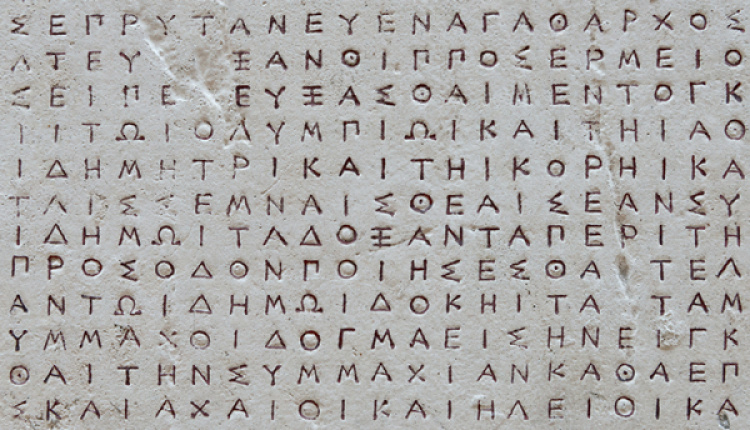5 Interesting Facts About The Greek Language
- by XpatAthens
- Monday, 22 February 2021

Since February 9th was officially declared International Greek Language Day in 2017, the Greek language is getting more and more attention. The principal aim for celebrating International Greek Language Day is to celebrate the vital, fundamental role played by the Greek language in the shaping of Western civilization throughout the centuries
February 9 was selected because it is the official remembrance day of Dionysios Solomos, who died on February 9, 1857. Dionysios Solomos is the Greek national poet famous for writing the Greek national anthem, titled ”Hymn to Liberty” (Ύμνος εις την Ελευθερίαν). This initiative encourages anyone interested in the Greek language and culture to learn our ancient and fascinating language and instigate more initiatives that will spread the Greek language and culture around the world.

Here are 5 surprising facts about the Greek language you may have never heard of:
1. The Longest Word In Literature is Greek

Here are 5 surprising facts about the Greek language you may have never heard of:
1. The Longest Word In Literature is Greek
According to the Guinness World Records, the longest word ever to appear in literature can be found in Assemblywomen, a comedy written by the Greek playwright Aristophanes.
The word is transliterated as:
lopadotemachoselachogaleokranioleipsanodrimhypotrimmatosilphiokarabomelitokatakechymenokichlepikossypho
phattoperisteralektryonoptekephalliokigklopeleiolagoiosiraiobaphetraganopterygon
or, in the Greek alphabet:
λοπαδοτεμαχοσελαχογαλεοκρανιολειψανοδριμυποτριμματοσιλφιοκαραβομελιτοκατακεχυμενοκιχλεπικοσσυφοφαττοπεριστεραλεκτρυονοπτοκεφαλλιοκιγκλοπελειολαγῳοσιραιοβαφητραγανοπτερύγων
It is the longest Greek word, with 183 letters and 78 syllables.
2. Greek Is The Oldest Recorded Living Language
Greek is the oldest recorded living language with written records in Greek spanning over 34 centuries. Greek derives from Proto-Greek, the first form of spoken Greek which dates back to the 3rd millennium BC. The language later evolved into Ancient Greek, which was spoken during the Antiquity, while Modern Greek emerged after the fall of the Byzantine Empire in 1453.
3. Originally, Greek Was Written From Right To Left
Like modern-day Hebrew and Arabic, Ancient Greek was written from right to left. Subsequently, Greek was written boustrophedon, meaning that lines alternated between right-to-left and left-to-right script. During the 5th century BC, the direction of Greek writing was standardized as left to right, and all the letters adopted a fixed right-facing orientation.
4. The Word ‘Alphabet’ Derives From The 2 First Letters Of The Greek Alphabet
The first two letters of the Greek alphabet are alpha (α) and beta (β). And while the English language uses Latin characters, the word ‘alphabet’ actually refers to Greek letters.
5. An Estimated 12% Of The English Vocabulary Has A Greek Origin
Did you know that almost every English word starting with ph such as philosophy, philanthropy, phobia, and phenomenon, comes from Greek? Greek hugely influenced the English language that is why many technical and scientific terms such as astronomy, biology, and mathematics, originate from Greek.
This content has been sourced and prepared by Codico Lab
